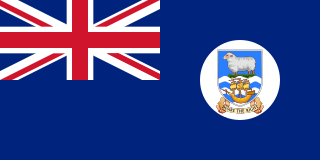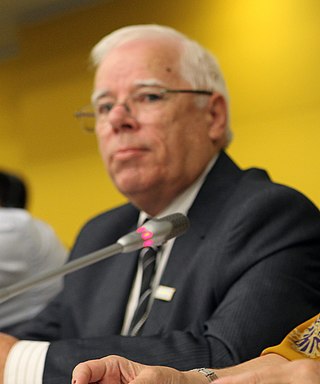
The history of the Falkland Islands goes back at least five hundred years, with active exploration and colonisation only taking place in the 18th century. Nonetheless, the Falkland Islands have been a matter of controversy, as they have been claimed by the French, British, Spaniards and Argentines at various points.

The Falklands War was a ten-week undeclared war between Argentina and the United Kingdom in 1982 over two British dependent territories in the South Atlantic: the Falkland Islands and its territorial dependency, South Georgia and the South Sandwich Islands. The conflict began on 2 April 1982, when Argentina invaded and occupied the Falkland Islands, followed by the invasion of South Georgia the next day. On 5 April, the British government dispatched a naval task force to engage the Argentine Navy and Air Force before making an amphibious assault on the islands. The conflict lasted 74 days and ended with an Argentine surrender on 14 June, returning the islands to British control. In total, 649 Argentine military personnel, 255 British military personnel, and three Falkland Islanders were killed during the hostilities.

Leopoldo Fortunato Galtieri Castelli was an Argentine general who served as President of Argentina from December 1981 to June 1982. Galtieri exercised his control over Argentina as a military ruler during the National Reorganization Process as leader of the Third Junta with Jorge Anaya and Basilio Lami Dozo.

The Armed Forces of the Argentine Republic are the combined armed forces of Argentina. It is controlled by the Commander-in-Chief and a civilian Minister of Defense. In addition to the Army, Navy and Air Force, there are two security forces, controlled by the Ministry of Security, which can be mobilized on occasion of an armed conflict: the National Gendarmerie, a gendarmerie used to guard borders and places of strategic importance; and the Naval Prefecture, a coast guard used to protect internal major rivers and maritime territory.
This article describes the composition and actions of the Argentine naval forces in the Falklands War. For a list of naval forces from the United Kingdom, see British naval forces in the Falklands War.

The invasion of the Falkland Islands, code-named Operation Rosario, was a military operation launched by Argentine forces on 2 April 1982, to capture the Falkland Islands, and served as a catalyst for the subsequent Falklands War. The Argentines mounted amphibious landings and the invasion ended with the surrender of Falkland Government House.

The Beagle conflict was a border dispute between Chile and Argentina over the possession of Picton, Lennox and Nueva islands and the scope of the maritime jurisdiction associated with those islands that brought the countries to the brink of war in 1978.
Sovereignty over the Falkland Islands is disputed by Argentina and the United Kingdom. The British claim to sovereignty dates from 1690, when they made the first recorded landing on the islands, and the United Kingdom has exercised de facto sovereignty over the archipelago almost continuously since 1833. Argentina has long disputed this claim, having been in control of the islands for a few years prior to 1833. The dispute escalated in 1982, when Argentina invaded the islands, precipitating the Falklands War.

Sir Rex Masterman Hunt, was a British Government diplomat and colonial administrator. He was Governor, Commander-in-Chief, and Vice Admiral of the Falkland Islands between 1980 and September 1985. During the Argentine invasion of the islands in 1982, he was taken prisoner and temporarily removed from his position.

The Falkland Islands is an archipelago in the South Atlantic Ocean on the Patagonian Shelf. The principal islands are about 300 mi (480 km) east of South America's southern Patagonian coast and about 752 mi (1,210 km) from Cape Dubouzet at the northern tip of the Antarctic Peninsula, at a latitude of about 52°S. The archipelago, with an area of 4,700 sq mi (12,000 km2), comprises East Falkland, West Falkland, and 776 smaller islands. As a British overseas territory, the Falklands have internal self-governance, but the United Kingdom takes responsibility for their defence and foreign affairs. The capital and largest settlement is Stanley on East Falkland.
There were many events leading to the 1982 Falklands War between the United Kingdom and Argentina over possession of the Falkland Islands and South Georgia.

The Falkland Islands Dependencies was the constitutional arrangement from 1843 until 1985 for administering the various British territories in Sub-Antarctica and Antarctica which were governed from the Falkland Islands and its capital Stanley.

The Falkland Islands have a complex history stretching over five hundred years. Active exploration and colonisation began in the 18th century but a self-supporting colony was not established till the latter part of the 19th century. Nonetheless, the islands have been a matter of controversy, as due to their strategic position in the 18th century their sovereignty was claimed by the French, Spaniards, British and Argentines at various points.

British sovereignty of South Georgia and the South Sandwich Islands is disputed by Argentina. The United Kingdom claimed South Georgia in 1775, annexed the islands in 1908, and has exercised de facto control with the exception of a brief period during the Falklands War in 1982, when the islands were partially controlled by Argentina. The dispute started in 1927 when Argentina claimed sovereignty over South Georgia, and subsequently expanded in scope with Argentina claiming the South Sandwich Islands in 1938. The islands have no indigenous population, and currently only have about 30 inhabitants.

Mario Benjamin Menéndez was the Argentine governor of the Falklands during the 1982 Argentine occupation of the islands. He also served in the Argentine Army. Menéndez surrendered Argentine forces to Britain during the Falklands War.

The aftermath of the 1982 Falklands War between the United Kingdom and Argentina affected world geopolitics, the local political culture in Argentina and the UK, military thought, medical treatment, and the lives of those who were directly involved in the war.

The Argentine Military Cemetery, Spanish: Cementerio de Darwin, is a military cemetery on East Falkland that holds the remains of 236 Argentine combatants killed during the 1982 Falklands War. It is located at Fish Creek to the east of the Darwin Settlement the location of the Battle of Goose Green. There is a replica of the cemetery at Berazategui in Buenos Aires Province, Argentina.

The occupation of the Falkland Islands and South Georgia and the South Sandwich Islands was the short-lived Argentine occupation of a group of British islands in the South Atlantic whose sovereignty has long been disputed by Argentina. Until their invasion on 2 April 1982 by the Argentine military junta, they had been governed by the United Kingdom since it re-established control over them in 1833.

Alejandro Jacobo Betts was a Falklands-born Argentine air-traffic controller and activist who worked with the Argentine government as a technical advisor on the Tierra del Fuego's Malvinas Question Provincial Observatory Advisory Council. Betts supported Argentina's claim to the Falkland Islands and was a controversial figure in the Falklands as a result. Betts also was the older brother of Terry Betts, who served as a member of the Falkland Islands Legislative Council and assisted British forces in the Falklands War. His younger brother Peter served in the British Task Force.

The Hope Bay incident occurred in February 1952 at Hope Bay on the Antarctic Peninsula. It involved an Argentine naval party from a nearby onshore base and a British landing party from the survey ship John Briscoe.
















